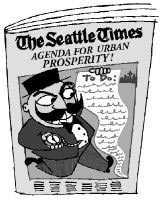The editorialists at Seattle’s dailies are all atwitter over recommendations, issued last week by a coalition of Seattle business community groups, that purportedly provide Mayor Greg Nickels with a thoughtful to-do list outlining the steps that need to be taken to give our city what the euphemists are now calling “a more competitive business climate.” It’s a favorite theme, dear to the hearts of people like The Seattle Times‘ owner, Frank Blethen. That’s why, despite Seattle’s long tradition of corporate welfare, when almost any sort of plaintive whine on the topic from some high-ranking corporate dude (especially from Boeing) crops up, it gets page-one treatment.
Last week was no different. Here, for example, is a snippet of July 3rd’s Times editorial on the recommendations: “Out of a long, thoughtful list, it’s hard to find any single item that cannot be incorporated into a larger agenda for urban prosperity. . . . It is a realistic document and deserves substantive responses from the mayor and City Council.”
Career politicians like Nickels know perfectly well that when groups like the Greater Seattle Chamber of Commerce, the Downtown Seattle Association, and the Neighborhood Business Council get together, they expect more than the usual form letter thanking citizens for their thoughtful input. They expect results, preferably by 4 p.m. that day.
But every recommendation? The folks at the Times apparently didn’t read the whole thing. And legislators (including our City Council members) are often notorious for not taking the time to read entire documents, including legislation they are about to vote into law. So, as a public service, I’ve read through the whole thing and am passing on to you some of the highlights news accounts somehow skipped. All the rest of these recommendations are likely to become law in the next few days, also.
- Cracking down on “chronic street drunks” in “high-alcohol areas” like Pioneer Square with a new program, operated in coordination with the Immigration and Naturalization Service (INS), to pick up people who appear to be inebriated and immediately deport them to whichever country they look like they or their ancestors might have once come from. Native American drunks will be sent to India.
- Providing support for development of new small businesses in Seattle’s neighborhoods by imposing a mandatory $2,000 a month minimum monthly rental fee on all single or multiple occupancy rental units located on arterial streets, with a year’s advance deposit. Either this will encourage the right kind of people to move into the neighborhood, or the units can be vacated and torn down so that they can be replaced by parking garages, small businesses, or mixed- use condos with ground-floor retail. The malls will come later. Bonus: higher density means fewer long commutes, which helps gridlock problems and is good for the environment.
- Abolish requirements that businesses provide a minimum number of on-site or street parking spaces. It costs too much, and this will encourage people to live within walking distance (see above). Those that can’t afford it should move to Kent, or Tacoma, or somewhere—anywhere but here. Get out.
- Cut down on burdensome red tape. Seattle is a world-class city, and other world-class cities—Calcutta, for example, and Addis Ababa—have hardly any business regulations at all. And, as several City Council members have noted, Singapore has much to teach us about becoming a thriving business-oriented democracy. Save the red tape for protesters.
- Encourage potential shoppers to feel safe. Mall management companies have known for years that a comfortable, anesthetized shopping environment—with perhaps some soft music and a tinkling fountain audible in the distance—does far more to boost sales than the threatening, unpredictable hustle and bustle of traditional city streets. To this end, all parks and sidewalks will be privatized.
- Create toll roads to cut down on traffic congestion. Roads entering Seattle will require use of debit cards to enter. Sophisticated technology will ensure that these cards not only pay for the highway fees but also have an adequate balance to guarantee that the person’s entry into our city is worth Seattle business’ time. Since poorer people will have been forced out by the rents, this will keep out the types that shop at Target or Costco. Protesters and street punks will also be excluded.
- Develop programs to support the arts by giving special debit cards to cover bus fare, tolls, and a waiver of the usual asset requirements so that musicians and artists may come in from Tacoma, where they’ll all live.
- Deed all of South Lake Union to Paul Allen. Already mostly implemented.








